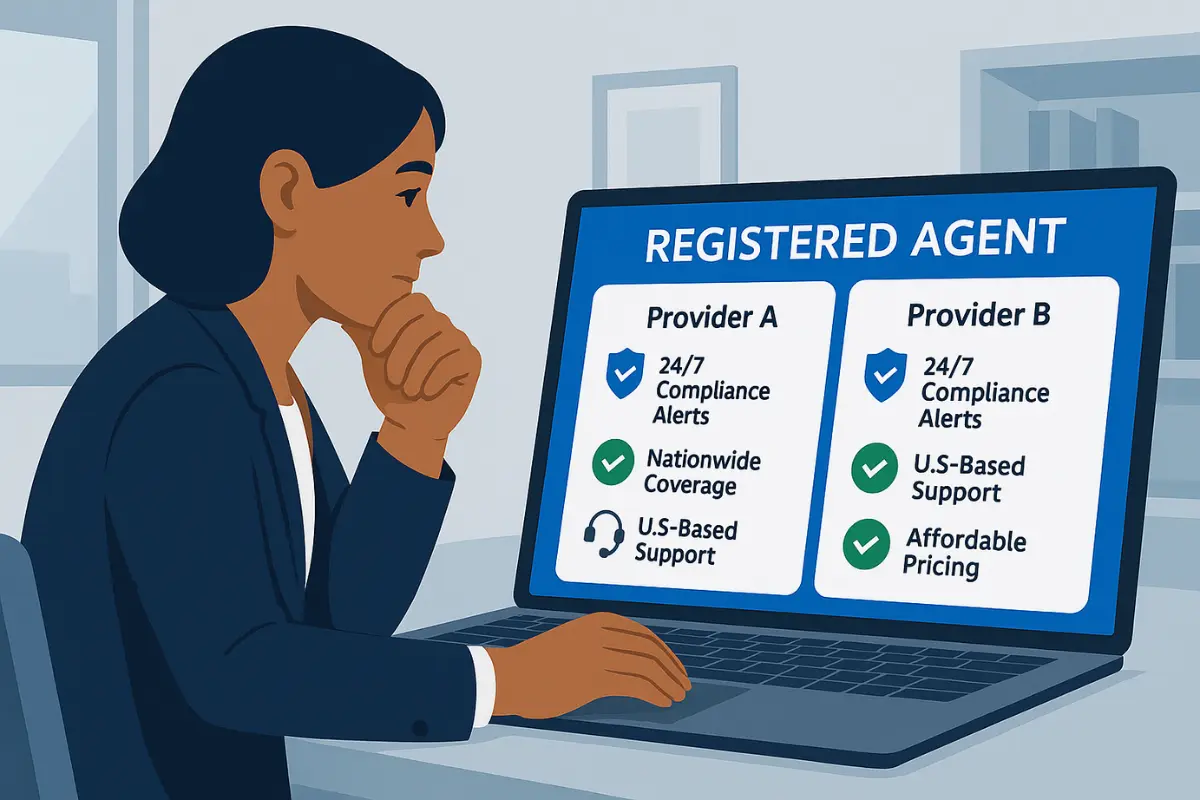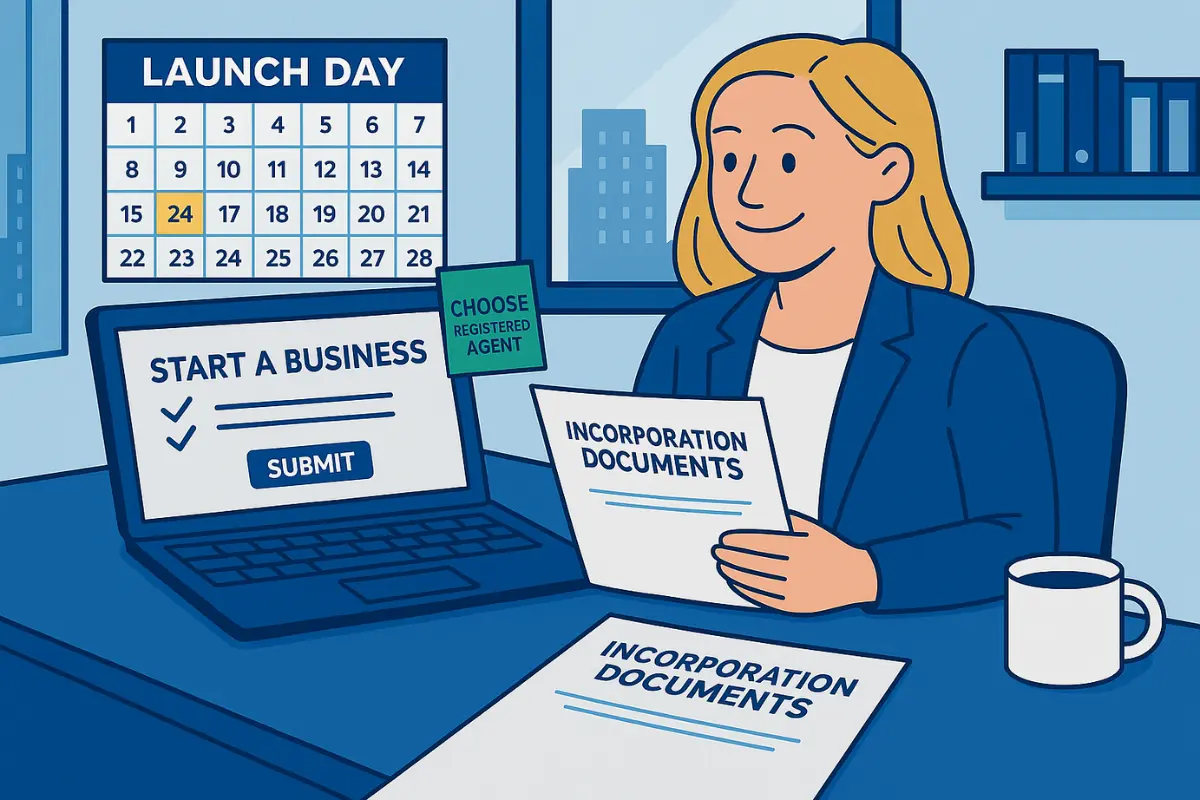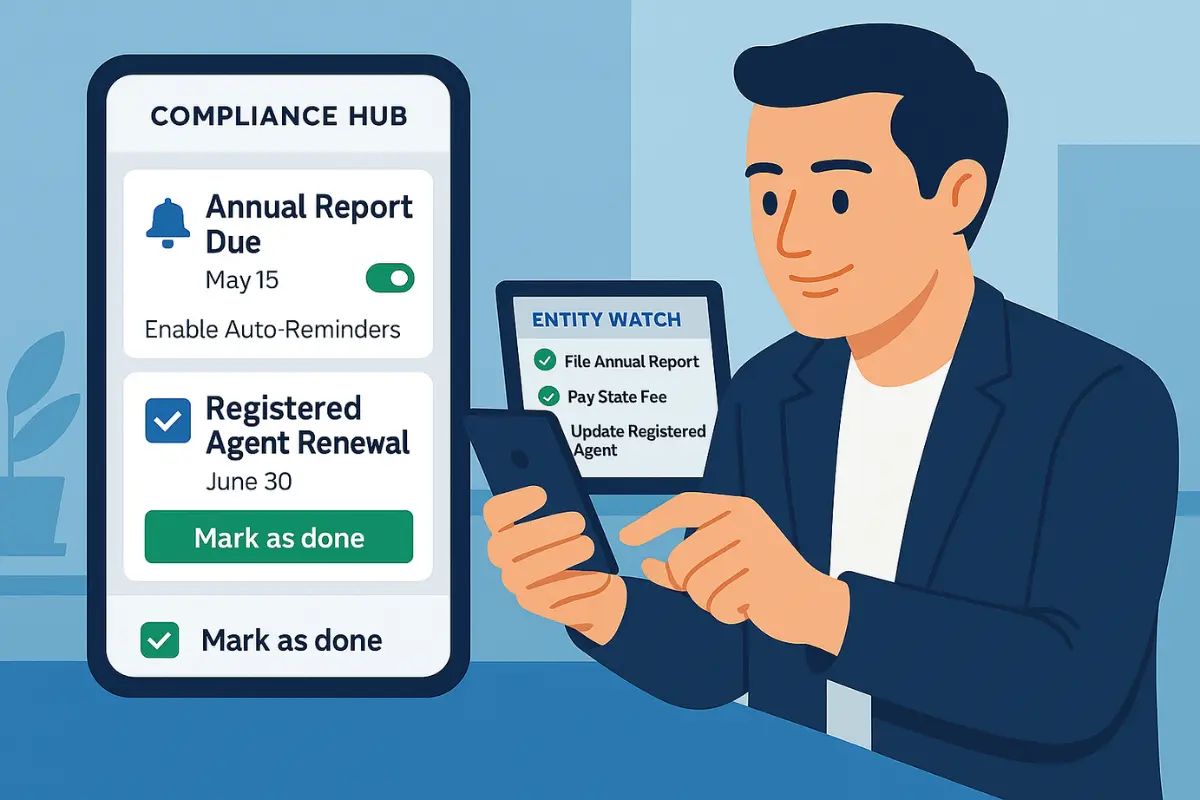How to Choose the Right Registered Agent

Consider this scenario: your business is sued, but the lawsuit papers sit unopened for weeks because your registered agent is out of town. By the time you find out, you've missed critical deadlines and now face a default judgment, a negative outcome that could have been easily prevented. You're suddenly liable for damages and never even had the chance to defend your business in court. This isn't just a nightmare; it's a realistic risk if you choose the wrong registered agent.
A registered agent is responsible for accepting legal documents and important government correspondence on behalf of your business. While designating a registered agent might seem like a minor administrative step, the decision is crucial. It can mean the difference between smooth compliance and costly legal troubles. This article will guide you through different types of registered agents, the key features to consider, and how to select the right option for your business's unique needs.

What Is a Registered Agent and Why Do You Need One?
A registered agent (sometimes called a statutory agent or resident agent) serves as your business's official point of contact for state governments and courts. Your registered agent is required to be available at a physical street address (not a P.O. Box or virtual office) during normal business hours to receive lawsuit notices, annual report reminders, tax notices, and other official correspondence. This ensures important notices are delivered in person and that your business can promptly address legal or compliance matters.
Without one, your business risks missing critical notices, incurring penalties or fines, default judgments, or even administrative dissolution, where the state terminates your business entity for non-compliance. All states require business entities like LLCs and corporations to maintain a registered agent with a physical address in each state where they conduct business.
While technically anyone meeting the basic requirements can serve as a registered agent, most businesses turn to a professional registered agent service for greater reliability, privacy protection, and compliance expertise.
Role and Legal Responsibilities
A registered agent's primary duty is to receive legal documents on your business's behalf; these include lawsuits, subpoenas, and court orders. This formal procedure is called "service of process" and is designed to help ensure your company is properly notified when it faces legal action, giving you a fair opportunity to respond.
As Cornell Law School explains, "Typically, it is not enough to simply mail process to the defendant. The summons and complaint must be either given directly to defendants or left with a suitable person at their home or place of business." This is why registered agents must be available in person to accept delivery during regular business hours.
Registered agents also handle important government correspondence, including compliance notices, state filings, and official letters from regulatory agencies. If legal papers can't be delivered because the agent isn't available, your business risks default judgment in a lawsuit, missed deadlines, and even losing good standing with the state.
The registered agent's role helps protect your business by making sure that you're always informed about urgent legal or compliance matters. Professional registered agent services often provide same-day electronic delivery of documents through secure client portals, allowing you to access time-sensitive information instantly rather than waiting for certified mail delivery.
Registered Agent Requirements by State
While all 50 states require businesses to designate a registered agent, the specific qualification requirements can vary by jurisdiction. Generally, a registered agent must either be a resident of the state where your business operates or be a business entity that's authorized to conduct business in that state.
The agent must maintain a physical street address within the state and be available during normal business hours to receive important documents. When forming your business, you'll include your registered agent's information in your registration documents. Some states require a separate registered agent form, while others gather this information during the general filing process. The Secretary of State uses these records to verify the entity appointed to accept legal and government documents on your company's behalf.
For businesses expanding across state lines, foreign qualification creates additional complexity since each state demands its own registered agent with a local physical presence. As the U.S. Small Business Administration explains, "If your LLC, corporation, partnership, or nonprofit corporation conducts business activities in more than one state, you might need to form your business in one state and then file for foreign qualification in other states where your business is active." This multi-state requirement often leads companies to seek professional registered agent services that offer nationwide coverage rather than managing separate agents in each jurisdiction.
When Should You Start Looking for a Registered Agent
The right time to hire a registered agent depends on what stage your business is in and your changing needs. Here are the most common moments to make the decision or revisit it:
-
During Initial Business Formation: You'll need to designate a registered agent before filing your formation documents with the Secretary of State. Many business owners initially choose to serve as their own registered agent to save money and reduce startup costs, but in order to minimize risks as the operation grows, it's wise to reassess this choice. Designating a professional service from the very beginning eliminates having to switch later on, keeps you compliant with state laws and protects your business starting from your initial formation.
-
When Your Business Circumstances Change: Consider switching to professional services when you start traveling frequently, move your primary address, take on employees, or begin handling sensitive client information that calls for enhanced privacy and reliability.
-
Before Multi-State Expansion: Start researching registered agent providers before expanding your business into new states. Partnering with a nationwide service can simplify foreign qualification and spare you from searching for new agents in each additional state.

Types of Registered Agents: Pros and Cons
The three main options include serving as your own registered agent, appointing someone you know, or hiring a professional registered agent. Cost, privacy, reliability, and compliance support vary dramatically between these choices, making it essential to understand how each option affects your ability to receive service when legal matters arise.
Acting as Your Own Registered Agent
Serving as your own registered agent gives you complete control over business documents and saves on annual registered agent service fees, which can make it appealing for owners who want to cut costs and stay personally involved in business compliance.
However, this approach requires you to list a physical address that becomes public in state records, which exposes you to unwanted solicitation and the risk of process servers arriving at your home or office if legal issues arise. Privacy and security concerns are especially relevant for home-based businesses.
Additionally, you must be physically present at your registered office address during regular business hours. If you travel frequently, become ill, or cannot be available, you risk missing critical legal notices, potentially resulting in default judgments or loss of good standing with the state. Small business owners often underestimate the significant amount of time and availability required to properly fulfill this responsibility, making it impractical for most people.
Professional registered agent services offer reliable privacy, constant availability, and compliance support, benefits that grow even more valuable as your business expands.
Using a Friend or Employee
Appointing a friend or employee as your company's registered agent may seem convenient and cost-effective since they are familiar with your business and can forward documents without extra fees.
But this convenience comes with risks that may outweigh the benefits. A friend or employee will likely lack the legal knowledge to recognize urgent documents or handle sensitive matters, increasing the risk of missed deadlines and mishandled paperwork. Also, if this person moves, changes jobs, or becomes unavailable, your business can easily fall out of compliance.
When their personal circumstances change, your business continuity and legal compliance can be impacted, potentially leaving you unable to receive service of process reliably. For these reasons, many business owners prefer the consistent coverage and expertise of a professional registered agent service.
Hiring a Professional Registered Agent Service
Professional registered agent services offer privacy protection, compliance expertise and reliable document handling. They provide a registered office address, so your address stays private and off public records, as trained professionals receive and manage all legal and government correspondence for you.
These services typically provide secure online portals, same-day delivery of scanned business documents, compliance reminders for annual report deadlines, and knowledgeable customer support. Many providers also offer business formation assistance, annual report filings and ongoing compliance or legal services, making them a practical solution whether you're just starting out or expanding your company.
While professional services do charge an annual fee, usually ranging from $99 to $300 depending on the provider, most business owners find this investment worthwhile for the peace of mind, privacy, and reduced compliance risks it provides.
Key Factors to Consider When Choosing a Registered Agent
Whether you're launching your first business or expanding into new states, these are the most important features to consider when evaluating a registered agent provider.
Availability and Reliability
Your registered agent must be consistently available during normal business hours to receive service of process and other legal documents. They must have reliable staffing and backup procedures to ensure no official notices are missed, even during holidays or staff changes. Look for a provider that has robust systems in place to guarantee uninterrupted coverage where they are physically located.
Physical Address in State
Your registered agent is legally required to maintain a real, physical street address, not a P.O. box, within the state where your business operates. When evaluating providers, confirm they have a staffed, established physical location in every state where you need coverage. This ensures that process servers can personally serve your registered agent with court documents and other official notices during normal business hours. Selecting a provider that is reliably present at this address ensures nothing important is missed when notices are delivered in person.
Privacy Protection
When evaluating registered agent providers, look for services that use their own registered office address for all public filings instead of your personal or business address. This means the provider's address, not yours, appears in public state records, shielding your home or business address from junk mail, unwanted visitors, and process servers. Confirm that the provider offers this privacy protection as part of their service.
Multi-State Coverage
If your business operates in multiple states, you are required to maintain a registered agent in each jurisdiction. National services allow you to consolidate all your registered agent needs under a single contract, offering consistent service standards and reliable delivery across every state. When evaluating providers, consider your expansion plans; choosing one with nationwide coverage means you'll avoid switching services as your business grows, and maintain consistent compliance and quality of service in every location.
Document Management System
Modern registered agent services provide secure client portals where you access scanned copies of all received notices, court documents and other documents immediately after delivery. Look for providers that offer same-day electronic delivery, cloud-based storage, and mobile-friendly access to your documents.
The best systems automatically notify you as soon as new important documents arrive and keep your records organized for easy reference, including tracking of state forms and other correspondence for complete business protection.
Compliance Reminders
Quality registered agent services send alerts for critical deadlines like annual reports and state filings. These alerts help ensure compliance and prevent late fees, penalties, and the potential administrative dissolution of your represented entity.
Tools that provide compliance alerts, such as EntityWatch, can help you track upcoming state filing deadlines or annual reports and keep your business in good standing. Some services also integrate with a compliance calendar, giving you a comprehensive overview of important compliance dates all in one place.

Pricing Transparency
Choose providers with transparent, upfront pricing that covers all essential features and no hidden fees. Beware of confusing pricing structures or frequent upselling tactics that push you to purchase more services or additional charges to access basic features like document scanning or electronic delivery.
When comparing options, review the total cost, including annual fees, any setup charges, state fees, and potential service upgrades. Remember, the lowest advertised price isn't always the best value if you have to pay extra for essential features.
Customer Support Quality
Reliable customer support becomes crucial when you need immediate assistance with document questions or compliance issues. Look for a provider with a knowledgeable, U.S.-based support team available during business hours by phone, chat, or email. Choose companies with teams that understand state-specific regulations, can explain deadlines and guide you through urgent compliance matters.
Reputation and Reviews
Research potential registered agent services through independent review platforms, customer testimonials, and third-party ratings such as the Better Business Bureau and Google Reviews. Avoid providers with frequent complaints about document mishandling or poor customer support. Transparency and consistency in reputation are key indicators of reliable service.
Checking reputation and reviews before hiring can provide valuable insights from other business owners about service quality and track record. Choosing established services with strong reputations helps ensure consistent performance in handling service of process and compliance across multiple jurisdictions.
Red Flags to Watch Out For
Use this warning guide to help you recognize signs of unreliable or low-quality registered agent services before committing. Spotting these red flags early can prevent compliance issues, missed legal notices, and unexpected costs.
Common red flags include:
-
Frequent upselling or confusing pricing that hides true costs
-
No real-time access to legal documents or outdated technology
-
Limited state coverage instead of nationwide service
-
Generic or unverified reviews possibly indicating fake feedback
-
Unclear guarantees or vague responsibility descriptions
-
Pressure for immediate signup without time to compare
-
Poor support or inability to handle urgent legal matters
Quality registered agent services focus on reliability over aggressive sales tactics and maintain transparent operations to keep your business compliant and informed.
FAQs
Can I act as my own registered agent?
Yes, if you meet your state's requirements, including maintaining a physical address in the state and being available during normal business hours. However, acting as your own agent increases risks: missing important legal notices or deadlines can lead to fines, loss of your company's good standing, or even personal liability. It also exposes your personal address to public records and demands constant availability, challenges many business owners prefer to avoid.
What happens if I don't have a registered agent?
Operating without a registered agent violates state requirements and can lead to administrative dissolution and loss of your company's good standing. Missing this critical requirement exposes your business to serious legal and financial risks, including fines, default judgments from missed lawsuits, and potential personal liability.
Can I change my registered agent later?
Yes, most states allow you to change your registered agent through simple filing procedures with minimal fees. You'll need to file updated registered agent information with the Secretary of State and notify your current agent as required by state law.
How much does a registered agent service cost?
Professional registered agent services typically cost between $99 and $300 per year, depending on the provider and the features included. Providers often offer other services like business formation assistance or annual report filing, available separately or as part of a bundled package. The best registered agent services balance competitive pricing with valuable features and responsive customer support to help businesses stay compliant and stress-free.
Can I be my own registered agent for my LLC in California?
Yes, you may act as your own registered agent in California if you are at least 18 years old, have a physical street address (no P.O. Boxes) in the state, and are available during normal business hours. However, many business owners find acting as their own agent challenging due to privacy concerns and the risk of missing important legal notices. Keep in mind that your address will become part of the public record.
Does Tennessee require a registered agent?
Yes, Tennessee requires limited liability companies, corporations and all other formal business entities to maintain a registered agent. They must have a physical street address in the state and be available during normal business hours to receive official mail and legal notices.
Final Thoughts: Picking the Right Fit for Your Business
Whether you're launching your first business or expanding into new states, reliability, customer support, and long-term value are essential when choosing a registered agent. A dependable registered agent simplifies operations, ensures compliance with state regulations, and protects your company, helping you avoid unwanted surprises and unnecessary stress. Partnering with an established provider with a proven track record truly makes all the difference.
Well-known and trusted registered agent services include:
-
Harbor Compliance
-
Northwest Registered Agent
-
ZenBusiness
-
LegalZoom
-
InCorp
In Forbes' recent article, "11 Best Registered Agent Services of 2025", staff writer Dennis O'Reilly, J.D., highlights InCorp as his preferred choice: "My top pick is InCorp due to its reasonable pricing and discounts if you sign up for a long-term agreement."
Since 1998, InCorp has provided exceptional business services to companies of all sizes. With an A+ rating from the BBB and currently serving over 250,000 customers, InCorp is an industry leader offering dependable compliance support in all 50 states.
Ready to secure reliable registered agent coverage? Contact InCorp today to make us your trusted registered agent.
Share This Article:
Stay in the know!
Join our newsletter for special offers.